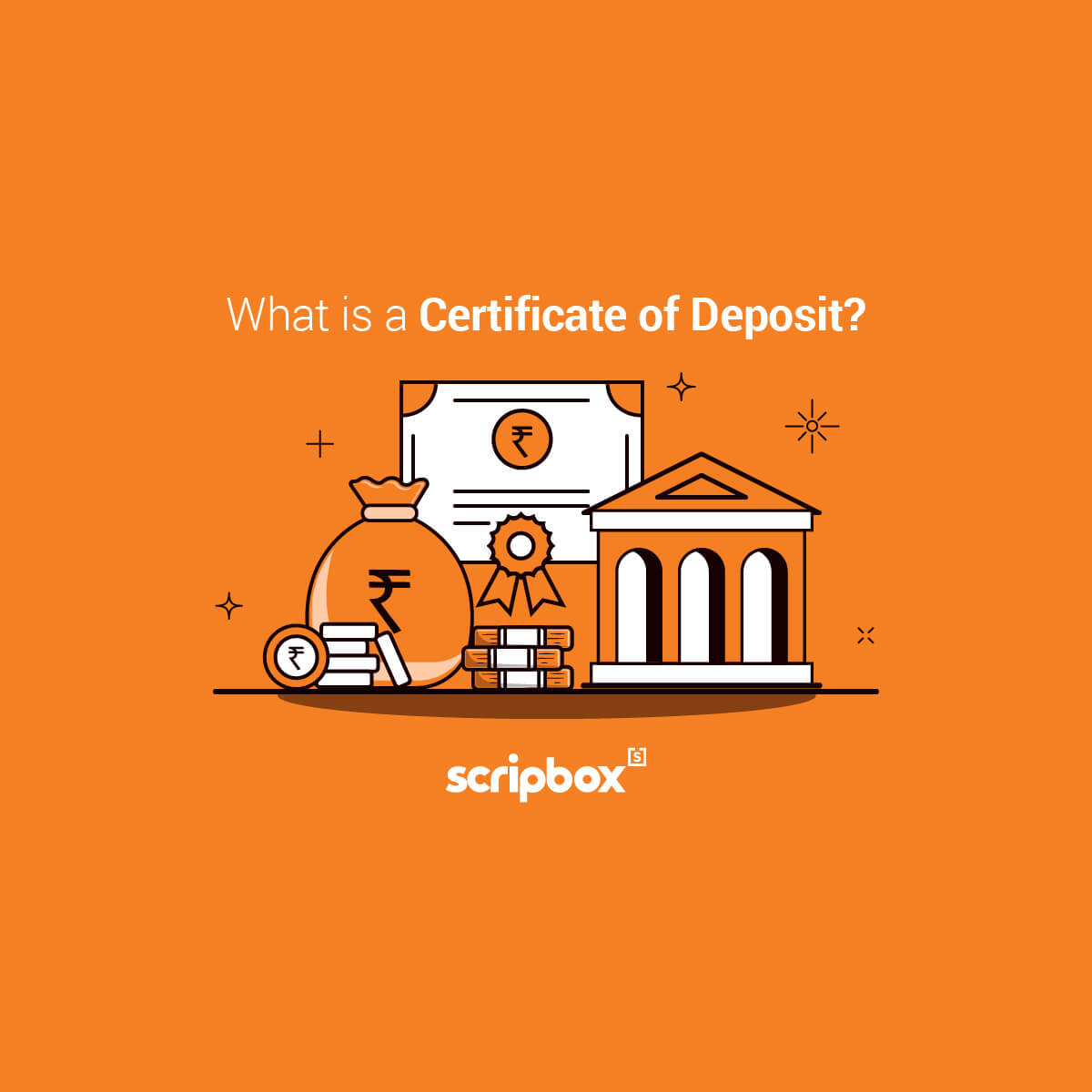The Government of India needs money to meet its financial requirements. They approach the general public to raise money. They can raise funds by offering different financial instruments for both short term and long term. However, there are very few money market instruments option for short term retail investors. Certificate of deposit is one such short term debt instrument. The short form for Certificate of deposit is CD, which is very popular. The retail participation in these instruments is minimal due to the unawareness about the options in this space.
What is a certificate of deposit?
Certificate of deposit (CD) is an agreement between the depositors and the authorized bank or financial institution. This agreement is for a specific period of time with a certain amount of money to invest where the financial institution pays interest. You can redeem at the time of maturity of the instrument. Hence, you cannot withdraw before the completion of the tenure.
CDs are issued in a dematerialized form. It is a promissory note that a bank or financial institution issues. Federal Deposit Insurance Corporation (FDIC) insures it. And Reserve Bank of India (RBI) regulates it. The RBI lays the guidelines regarding the investments in CDs.
At the time of maturity of a CD, the depositor gets a grace period of 7 days to decide about the matured amount. In case the depositor does not withdraw within the seven days grace period, the maturity amount is reinvested. Furthermore, one can also withdraw the matured amount after the grace period by paying the penalty. Otherwise, the actual investment cannot be redeemed on demand or penalty payment.
CDs were introduced in the year 1989 to increase the range of money market instruments. This enables investors to manage short term funds more effectively.
Features of Certificate of Deposit
One should understand the salient features of Certificate of deposit before investing.
Eligibility
RBI authorizes only a few selective banks and financial institutions to issue CDs. There are specific guidelines that RBI issues for the purchase of CDs. Banks can issue CDs to individuals, mutual funds, trusts, insurers and pension funds.
Maturity Period
Commercial Banks issue CDs which have a tenure ranging from 7 days to one year. However, financial institutions issue Certificate of deposits with different maturity dates. They can be 1year CD upto 3year CD.
Minimum Investment
The Certificate of deposits CDs are issued in the multiples of Rs.1lakh, and the minimum size of investment is also Rs. 1lakh.
Transferability
An electronic certificate of deposit is transferable through endorsement or delivery. However, certificates in the demat account are transferable as per the guidelines of the demat securities.
Loan against Certificate of Deposit
Banks do not grant loans against CDs since these certificates do not have a lock-in period. Banks cannot buy back CDs before maturity.
Discount on Certificate of Deposit
Certificate of deposit is issued at a discount on face value. Also, financial institutions, banks and credit unions can issue Certificate of deposits on a floating rate basis. The method of calculating the floating rate is market-based
Eligibility for issuance of a certificate of deposit
Reserve Bank of India has laid down the following specifications for both investors and lenders for Certificate of deposit –
- Only selected financial institutions and scheduled commercial banks issue Certificate of deposits CDs in India within a specific limit. The Federal Deposit Insurance Corporation (FDIC) insures it.
- Certificate of deposit is issued to depositors. With this, depositors are individuals, companies, corporations and mutual fund houses.
- Certificate of deposits CDs can also be issued to Non-Resident Indians (NRIs) on a non-repatriable basis. However, one cannot endorse CDs to another NRI in the secondary market.
- Banks and financial institutions cannot provide loans against Certificate of deposits. Also, banks cannot buy their CDs before the latter’s maturity.
- However, cooperative banks and regional rural banks cannot issue the Certificate of deposits.
- As per RBI guidelines, banks have to maintain their Statutory Liquidity Ratio (SLR) and cash reserve ratio (CRR) on the price of Certificate of deposit.
Advantages and limitations of investing
Though Certificate of deposits are one among many useful investment options, they have their benefits and limitations of investing
Advantages
Safety
Investment in the stock market or debt funds is very volatile. However, one considers investment in Certificate of deposits as safe because banks or financial institutions issue them. Further, they invest in safe instruments that generate growth.
Returns
The Certificate of deposits CD rate is pre-determined throughout the investment tenure. Hence, they offer better returns when compared to the savings account. Also, staying invested for a longer duration in a certificate of deposit generates higher returns. Hence, financial institutions issue Certificate of deposits with different maturity periods like 1year CD up to 3year CD.
Flexibility
One can choose the duration and issue price of CDs they want to invest. However, the bank sets the parameters. One can also opt for monthly, annual or a lump sum payout at the time of maturity of the CD. Therefore, investors can select based on their investment planning and financial plan objectives.
Grace Period
On maturity of CDs, investor’s get a grace period of 7 days which help them decide about their maturity amount. One can continue to reinvest or withdraw the same.
Limitations
Returns
Compared to other stock market or debt fund investment options, Certificate of deposits yield lower returns. The government backs them. Usually, CDs are issued at a discount value and redeemed at face value. Therefore, irrespective of the economic condition of the country, the returns earned by investors though Certificate of deposits remains fixed.
Limited Liquidity
One can only redeem the matured amount after the grace period by paying a withdrawal penalty. Otherwise, one cannot redeem the actual investment amount on demand or penalty payment. Hence, Certificate of deposits has limited liquidity.
Who should invest in a certificate of deposit?
Financial institutions and authorized banks and credit unions issue Certificate of deposits which are ideal for investors who are looking for secure investment and reasonable returns. RBI issues the guidelines regarding the investment in CDs. The details regarding the price, i.e. issue price and par value are known prior to the issue. Therefore, Investors can get full transparency and flexibility to choose their option based on their investment planning objective. This also helps in wealth creation for their financial plan in future.
Certificate of deposit is suitable for any investor irrespective of their knowledge and risk tolerance levels. It can also add as a safe investment alternative for investors looking for portfolio diversification. Thus, diluting the risk of overall portfolio allocation.
As per RBI guidelines, the following also can invest in Certificate of deposits
- Individual
- Banks
- Corporations
- Trusts
- Financial institutions
- Mutual fund houses
- Non-resident individuals (NRIs) can subscribe only on non-repatriable basis. However, one cannot endorse CDs to another NRI in the secondary market.
- But cooperative banks and regional rural banks cannot issue the Certificate of deposits.
How to calculate income earned from a certificate of deposit?
There are two parameters that scheduled commercial banks and financial institutions consider while issuing a certificate of deposit.
Discount on face value
The financial institution or the bank has the right to decide the discount rate of the security. This bank’s cd rates are also known as coupon rates. For example, a certificate of deposit has a face value of Rs.100. An individual can purchase the same at a discount value of Rs.98. At the time maturity, individual gets the full maturity value of Rs.100
Floating rate basis
The process of calculating the floating rate is based on a market benchmark. This ensures transparency for investors. The CD rate varies from time to time in India.
Therefore, investors must understand whether the CDs issued on discount on face value or floating rate basis. Based on this, an investor can calculate their annualized income.
Things to consider before investing
One should consider the following things before investing in Certificate of deposits.
Tenure of CD
The maturity period of Certificate of deposit determines the rate of interest of the Certificate. It implies that, the longer the maturity period, the interest rate will be higher and vice-versa.
Returns
Before investing in CDs, one must study the previous banks cd rates and returns delivered by banks or financial institutions. Based on this study, the investor must make a wise decision to choose the right instrument.
Rate of interest
The interest rates in the country change from time to time-based on the economic situation of the country. Thus, the interest rates of CDs might also vary from time to time. RBI regulates the guidelines for investments in CDs and changes in interest rate. Hence, investors must keep track of interest rate changes regularly.
Limited Liquidity
While investing Certificate of deposits, investors must specify the duration of their investment. In case the investor wants to redeem the money before maturity, they are liable to pay the withdrawal penalty.
Interest rate changes
The banks renew CD interest rates regularly. Also, the interest rate of CDs is not dependent on the rate of inflation. However, the actual cost may decrease with the rising inflation rate.
Investment Duration
The rate of interest that the investor earns will be dependent on the investor time period of investment. Longer the investment tenure, higher the interest rate.
Investing in a certificate of deposit is a secure way in the short and medium-term. They can also be suitable for cash amount that one does not need for an extended period of time. One who is looking for a fixed return in their portfolio can consider investing in Certificate of deposit.
Are FDs and certificates of deposit different?
Certificate of deposit in India is an agreement between the depositor and the authorized bank or financial institution. It is an agreement for a specified time period with a certain amount of money to invest. The interest is pre-decided and paid by the financial institution. One can redeem the amount at the time of maturity. Therefore, one cannot withdraw the amount before the completion of the tenure. However, the investment amount is negotiable.
In comparison to CDs, bank fixed deposits are also for a fixed tenure and fixed interest rate. In bank fixed deposits, the amount can be redeemed before completion of a term with a specific penalty amount. However, the interest rate of the fixed deposit is higher than the savings bank account. Unlike CDs, the investment amount is not negotiable.
Frequently Asked Questions
Authorized banks and financial institutions can issue Certificate of Deposit. Individuals, banks, corporations, trusts, mutual fund, etc. can invest in CDs. One can pick a type of CD they want to invest based on their investment duration. Next, is to choose how they want to collect their interest payments either monthly or annually. Finally, once an individual opens the demat account, the CD will be in the demat account.
The bank’s issue CDs in multiples of Rs.1 lakh. Therefore, the minimum size to invest in CD is Rs.1lakh. The investor can increase the amount in multiples of Rs.1 lakh based on their investment capacity.
An electronic/dematerialized certificate of deposit can be transferred through endorsement or delivery. However, certificates that are held in demat account can be transferred as per the guidelines of the demat securities.
Usually, the banks or financial institutions notify the investors when the CD is maturity. The investor is also given a grace period to renew or withdraw the money after maturity date. In case the investor misses it even during the grace period, the CD renews automatically. The price, maturity dates and the interest rate of the new CD might vary from the previous CD.
A 12 month CD is a short term deposit that offers a higher interest rate than any standard savings bank account or money market account. A 12 month CD means that the money is locked in for a period of 12 months. Investors will not be able to access these funds for the entire duration. However, they can prematurely withdraw the amount by paying a penalty. Investors can choose to withdraw the deposit after the period of 12 months or can also roll it over for another year.
The minimum investment amount for a CD is INR 1,00,000 and in multiples thereafter. There is no limit on the maximum amount of investment. Therefore, investors can invest in multiples of INR 1,00,000.
When a CD matures, the investor is given a seven days grace period to withdraw the investment. If the investor fails to withdraw the investment within the 7 days grace period, the CD (maturity amount) automatically gets reinvested. Furthermore, if the investors wish to withdraw after the 7 days grace period, they’ll have to pay a penalty.
Related Articles
- What is a certificate of deposit?
- Features of Certificate of Deposit
- Eligibility for issuance of a certificate of deposit
- Advantages and limitations of investing
- Who should invest in a certificate of deposit?
- How to calculate income earned from a certificate of deposit?
- Things to consider before investing
- Are FDs and certificates of deposit different?
- Frequently Asked Questions





























Show comments